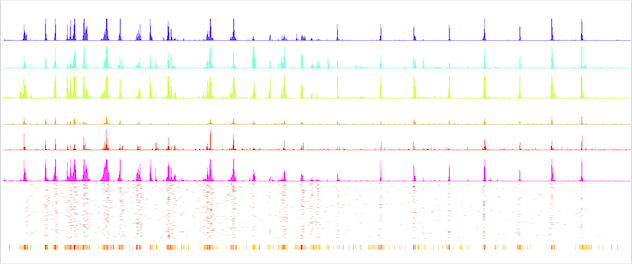 Examining epigenomic profiling
Examining epigenomic profiling
Researchers in the Functional Epigenomics Lab focus on epigenomic profiling to understand how expression patterns are modulated in tumor cells, leading to individualized cancer treatments. The team studies how chromatin affects cellular programs with a specific focus on the enhancer function and transcriptional dependencies in stem cell states, cancer progression and drug resistance.
Overview
A single cell is the ultimate unit of a multicellular organism. The human body is composed of an estimated 37.2 trillion cells that live harmoniously among their neighbors. An equilibrium between differentiated cells, progenitor cells and stem cells has to be achieved at any point of development to enable homeostasis and proper tissue organization. However, in cancer, the disruption of such equilibrium can lead to the generation of single cells that are able to metastasize and invade different organs. Since chromatin is the physiological form of our genome, the highly dynamic chromatin landscape plays an important role in shaping cell identity, in dictating cellular responses to diverse signals, and ultimately creating cellular heterogeneity.
The Functional Epigenomics Lab research team focuses on cis-regulatory elements called enhancers. Enhancer elements have been described for more than 40 years, serving as binding sites for transcription factors to modulate gene expression. Recent studies have been able to characterize the chromatin environment that shapes enhancer elements, allowing researchers to predict over 500,000 putative enhancers in the human genome annotated by the ENCODE project, exceeding by more than tenfold the number of genes. In cancer, the role of enhancers in malignant transformation has been highlighted by the discovery of locus-specific gains (tumor-specific enhancers) and losses in enhancer activity across the epigenome that correlate with metastatic potential and drug resistance.
In Dr. Maia's lab, the goal of his research team is to understand and modulate chromatin regulation during enhancer activation to identify novel biomarkers of metastatic disease and drug resistance. To achieve this goal, the researchers use a broad range of the most advanced techniques in epigenomic profiling, genome editing-based screens, circulating tumor cell isolation, 3D organoid cultures and xenograph models from people with cancer, in a collaborative environment with colleagues at Mayo Clinic and around the world.
About Dr. Maia
Alexandre Gaspar Maia, Ph.D., is a senior associate consultant and a faculty member in the Division of Experimental Pathology and Laboratory Medicine within the Department of Laboratory Medicine and Pathology and a member of the Epigenomics Program at the Center for Individualized Medicine at Mayo Clinic.